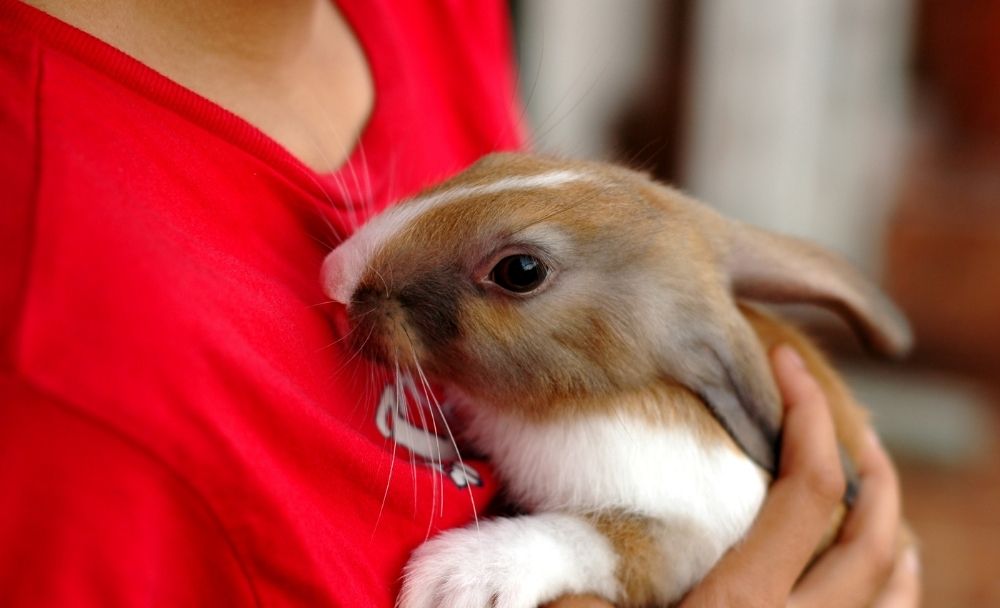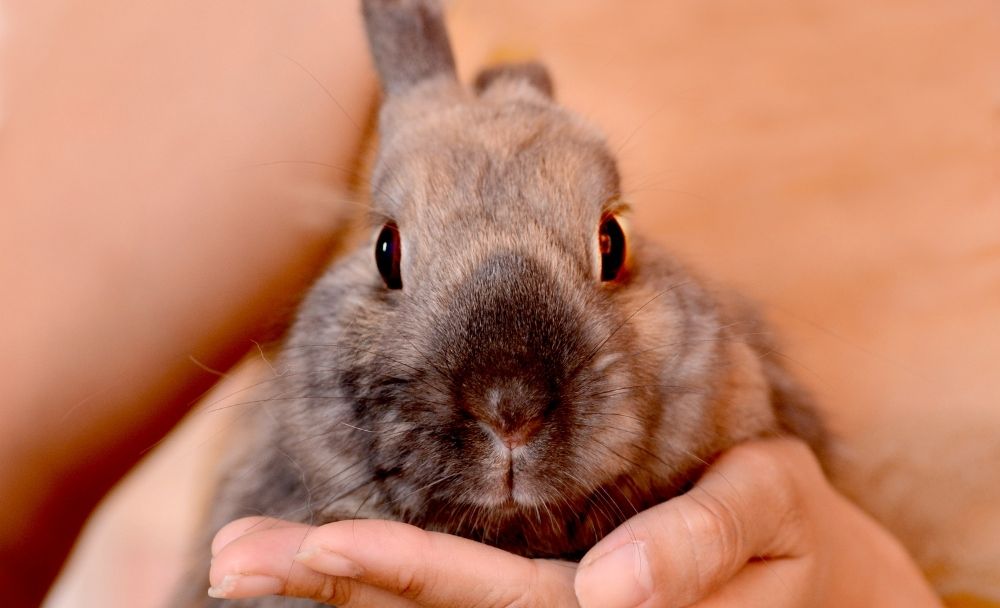Shock is a physical condition that can occur when rabbits become so terrified that their body starts to shut down. Their body temperature drops, and your rabbit may become unresponsive. Depending on the rabbit, a shock response can occur for a couple of minutes or extend to several hours.
Rabbit bath shock is a potentially fatal condition. The combination of the stress of bathing, hypothermia, a drop in heart rate and blood pressure causes your rabbit to become weak and lifeless, which may lead to death.
Shock is a severe condition that you want to understand however it’s not as typical as many make it out to be. Bunnies can enter into shock from almost any event that is scary for them. A surprise dog bark close by or being plunged into cold water are both examples of ways your bunny could go into shock. Most of the time, rabbits will flee and act afraid for a little while before returning to normal behavior.
Many rabbits can recuperate from shock if they are provided care and comfort. This condition can also be deadly for bunnies.
What is Rabbit Bath Shock?
Rabbit bath shock is where a rabbit has gone into shock after being bathed. Baths are harmful to bunnies and sometimes even deadly. Rabbits are incredibly fragile creatures. The shock and tension of being washed can trigger fatal conditions such as heart attacks and gastrointestinal stasis.
Bunnies can likewise enter into a trance as a result of being bathed. While the rabbit may look peaceful, the phenomenon is called tonic immobility. The rabbit looks like it is playing dead, and it is a fear-based reaction to predators. For many rabbits, this reaction is undesirable and involuntary.
Research studies have revealed that a rabbit’s heart rate and blood pressure drop while being tranced. While it can be a practical tool to soothe a feisty rabbit when visiting the vet, it should not be done recreationally – with or without a bath.
Why Rabbit’s Coats Should Not Get Wet

A rabbit has a top coat of fur and an undercoat of fur. Rabbits constantly shed their fur, making them self-cleaning in many circumstances. This applies to most rabbits except angora rabbits, who need a little help grooming their long hair.
The topcoat of a rabbit is designed to protect the undercoat, which protects the skin from wetness and moisture.
By bathing a pet rabbit, you run the risk of soaking both the topcoat and undercoat of the fur. Even if you towel dry your rabbit, the density of the undercoat may cause water to be trapped against your rabbit’s skin.
Water trapped against your rabbit’s skin will make your bunny cold and lead to hypothermia. It can also cause the skin to weaken and be more prone to abrasions and dander problems.
The Dangers of Bathing a Rabbit
Several things can happen to your rabbit during the bathing process. They are:
GI Stasis
The stress of bathing can cause a rabbit’s digestive system to shut down. This is known as GI stasis in rabbits, which can be a fatal condition unless treated within the first day or two. Rabbit’s digestive systems are fragile. If you don’t closely monitor your bunny, you may not notice your rabbit’s gastrointestinal system has shut down until it is too late.
Spinal Injuries
A rabbit’s spinal column can break if your rabbit is placed in water and it is frightened. It will instantly try to jump out of the water, and if the back feet are not correctly supported, your rabbit can twist itself, causing a fracture of its spine. Your rabbit will not survive this.
Hypothermia
As I mentioned above, if your rabbit’s undercoat gets wet, it will cause your bunny’s temperature to drop. Even if you give it a warm bath, the residual air temperature can cool your rabbit significantly.
Don’t be tempted to entirely blow-dry your rabbit with your hairdryer, either. This can cause burns to your bunny’s sensitive skin. Rabbit’s skin can also tear easily. Blow-drying an entirely wet bunny would be just as stressful for the rabbit as bathing.
Signs and Symptoms of Rabbit Bath Shock
Clinically, what is happening to a bunny when they go into shock is that their body temperature falls to dangerous levels. If they aren’t able to recuperate, this causes the bunny’s organs to slow down and eventually shut down entirely. Their cardiovascular system will become weak, and their heart will ultimately shut down.
In practical terms, this means the bunny will become weak, unresponsive, and cold. The symptoms to look for are:
- Weak or limp bunny. This is when your rabbit does not react to your touch and feels limp in your arms.
- Pale gums. A rabbit’s gums are usually pink when they are in good health.
- Cold ears and feet. Blood is sent to the vital organs (such as the heart), so your bunny’s ears and feet may feel cold.
- Weak or thready pulse. You can check your rabbit’s pulse by touching the large vein that runs up their ears.
- Fast Breathing (hyperventilation) with their mouth open. It is uncommon for a rabbit to breathe with its mouth open.
- Dull and glazed over eyes that are not focused on anything.
- There is a drop in body temperature (hypothermia) below 100ºF (38.1 ºC).
How to Treat a Rabbit with Bath Shock
When rabbits go into shock, they lose their ability to maintain their body temperature. If your bunny shows any of the above signs and symptoms of rabbit bath shock, here are some tips:
Warm Your Rabbit
Wrap your bunny in a soft towel and keep them warm. If you have a heating pad or a hot water bottle, you can also place this near your rabbit to help raise their body temperature. As rabbits have very fragile skin, don’t sit your bunny directly on the heating pad or hot water bottle. This can cause burns.
If you can take your rabbit’s temperature level, it’s a great idea to do so. You can then give this information to the vet, and it will be helpful for future comparisons.
Call Your Vet
Most rabbit owners will have a regular vet who is experienced with rabbits. If you don’t have a specialist rabbit vet, ring the closest one available, explain your circumstances, and ask for advice.
I have not recommended going straight to the vet, as car rides can increase stress in rabbits. Take a moment to make a phone call and see if the vet thinks you can manage your rabbit at home in its own environment.
This may not always be the case; your bunny may require intravenous fluids and specialist treatment to help it recover. Either way, you will need to make plans to see your vet based on their advice.
Act Swiftly But With Care
Rabbits that suffer bath shock can deteriorate very quickly. If your rabbit’s body temperature continues to fall, it could result in a fatal situation for your rabbit.
Your vet will give you the best advice on whether you can manage your bunny at home and how to help your rabbit recover from bath shock.
How to Prevent Rabbit Bath Shock

Naturally, you can avoid rabbit bath shock by not bathing your rabbit. But sometimes, you may find that your rabbit has a dirty bottom and feet and needs some help with cleaning.
In this circumstance, you can give your rabbit what is known as a butt bath. This is where you only bathe the rabbit’s back end. To do this, I suggest you:
- Use only clean water first. If you are washing away urine, this should be enough.
- If needed, choose a safe rabbit shampoo. Many human and pet shampoos are not suitable for rabbits.
- Use a grate for your rabbit to sit on so it is not sitting in a pool of water.
- Support your rabbit well to avoid any injury.
- Do not soak your rabbit through to its skin.
- Use tepid water – not too hot, not too cold.
- Do not get your rabbit’s head wet.
- Dry your rabbit thoroughly after the butt bath, using a hairdryer on low heat if needed.
Remember, your rabbit should smell like a rabbit. Rabbits are sensitive animals, and using strongly perfumed cleaning agents can cause additional stress for your bunny.
If you have multiple rabbits, your other rabbits may not recognize the smell of your bunny either. This can cause issues within your pack.
Conclusion
Stress affects your rabbit’s health, and rabbit bath shock is very real. Rabbits are complex animals and prey animals in the wild, making them very easily frightened. Avoid rabbit bath shock by never fully bathing your bunny. Follow my tips above for a simple butt bath only when needed, or talk to your veterinarian, who may be able to assist.

